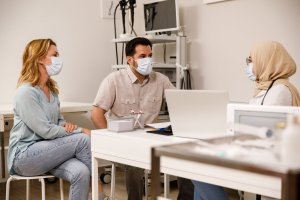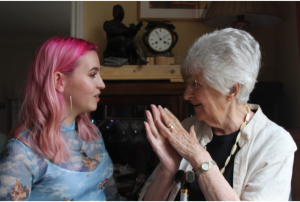Karen Morley reflects on her experience of becoming a consumer author on a Cochrane Review, using her lived experience of Obsessive Compulsive Disorder (OCD) and considers the questions it raised for her about Public Involvement in research.

Sharing health evidence you can trust


Karen Morley reflects on her experience of becoming a consumer author on a Cochrane Review, using her lived experience of Obsessive Compulsive Disorder (OCD) and considers the questions it raised for her about Public Involvement in research.

Peter Buckle, a patient advocate whose wife died of glioblastoma, and Professor Scott Murray, GP and palliative care innovator, call for honest communication between health professionals and people with glioblastoma and their families, enabling shared decision-making and planning, with a focus on quality of life. They give sources of information and support for patients and families, and practical suggestions for clinicians.

This blog summarises a conversation hosted on Twitter by Cochrane UK, inviting views on the use and misuse of language when talking about long-term conditions.

In this blog for anyone affected by, or interested in, long-term conditions, Anne Cooper, a person with Type 1 Diabetes, Bob Swindell, a person with Type 2 Diabetes, and Cathy Lloyd, Professor of Health Studies at the Open University, explore the impact language can have on people who live with a long-term condition, including helpful tips for healthcare professionals for choosing helpful and appropriate language.

In the second part of a two-part blog for our special series on living with long-term conditions, Brian Devlin, Ceri Dare, Genna White and Olivia Fulton, the four Cochrane UK Consumer Champions, and Emma Doble, Cochrane UK’s Patient and Consumer Coordinator, reflect on making treatment decisions, what they want healthcare professionals to know, and what they would tell their younger selves.

In the first part of a two-part blog for our special series on living with long-term conditions, Ceri Dare, Brian Devlin, Olivia Fulton and Genna White, the four Cochrane UK Consumer Champions, and Emma Doble, Cochrane UK’s Patient and Consumer Co-ordinator, reflect on the daily burden of work that comes with living with a long-term condition, how they’ve managed during the pandemic, and sources of information and support they find useful.

In this blog for patients and doctors, Dr Mark Horowitz, training psychiatrist and Clinical Research Fellow at University College London, looks at the latest Cochrane evidence on how to safely stop antidepressants and explores the implications for patients and doctors having to navigate this area so neglected by medical researchers. Mark’s personal experience of the difficulty in coming off antidepressants led to an interest in the little-understood field of stopping psychiatric medication, and the balance of harms and benefits.

Throughout June, we are shining a spotlight on living with long-term conditions, sharing blogs that include relevant evidence and personal reflections. The series will also include a discussion on Twitter about the impact language can have on people with long-term conditions.

Recently, Cochrane UK undertook some qualitative work to explore what the comments posted on Evidently Cochrane blogs might tell us about what readers get from our blogs. In this blog, the Editors of Evidently Cochrane, Sarah Chapman and Selena Ryan-Vig, and qualitative researcher Fran Toye, talk about the methods they used, the insights they gained, and the subsequent changes made to the blogs to make them more useful to readers.

A blog about activities for people with dementia, drawing on evidence and experience.

In this blog for informal cancer caregivers, Beverley Lim Høeg and Pernille Envold Bidstrup, who are both psychologists and cancer researchers, look at the challenges faced by those caring for a loved-one with cancer and explore why informal caregivers deserve more support and focus in cancer treatment and research. Pernille is also the mother of a 9 year old cancer survivor.

We invited people to share their experiences and views on communicating about cancer on Twitter. In this blog, Sarah Chapman reflects on what emerged.